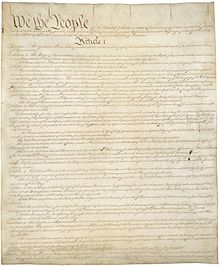The « Section Three, » in the title above, refers to the 14th Amendment to the U.S. Constitution (passed by the Reconstruction Congress in 1866 and ratified in 1868). Section 1 of the Amendment famously nullified the infamous Dred Scott Decision, established the important principle of birthright citizenship, and imposed on the states the obligations of « due process » and « equal protection. » Section 2 replaced the famous « three-fifths compromise » with one-person, one-vote, and provided penalties (to the best of my knowledge never enforced) for states which deny some citizens the vote. Section 3, which is what concerns us here, states: No person shall be a Senator or Representative in Congress, or elector of President and Vice-President, or hold any office, civil or military, under the United States, or under any State, who, having previously taken an oath, as a member of Congress, or as an officer of the United States, or as a member of any State legislature, or as an executive or judicial officer of any State, to support the Constitution of the United States, shall have engaged in insurrection or rebellion against the same, or given aid or comfort to the enemies thereof. But Congress may by a vote of two-thirds of each House, remove such disability.
The 14th Amendment was adopted to reconstruct the country on a new basis after the crime of secession and the resulting Civil War. Section 3 responded to a particular historical situation. Having served that purpose, is it still relevant? That it remains relevant is the contention of two conservative legal scholars, William Baude and Michael Stokes Paulsen, authors of « The Sweep and Force of Section Three, » which can be found at:
https://papers.ssrn.com/sol3/papers.cfm?abstract_id=4532751
I am not a lawyer, and my modest knowledge of constitutional law is ancient and admittedly minimal. But, for all the legal language and arcane references, the authors’ 126-page case is clearly argued and quite convincing. Amendment 14, section 3, is part of the U.S. Constitution and remains fully operative today. Not specifically limited to the Civil War, it applies to any « insurrection or rebellion. » Congress in subsequent statutes did use its power to lift the penalty, removing it from those on whom it had been imposed, but it did not prospectively remove it in unknown future cases. The penalty remains in force and has automatic legal effect, like other constitutional disqualifications (e.g., being too young, not being a citizen, or, in the case of the post-22nd-amendment presidency, having already been elected twice). The authors cite the example of Couy Griffin, an elected County Commissioner in New Mexico, who participated in the January 6, 2021, insurrection. Some New Mexican citizens filed a quo warranto suit seeking his removal. A court heard the case and ruled he had been disqualified as of January 6, 2021, and ordered his immediate ejection from office. The authors explain the many and various procedures provided for removing officials and/or preventing disqualified candidates from running for or being appointed to office. (The authors obviously recognize the likelihood of a court challenge by a candidate disqualified from the ballot on such grounds and the consequent responsibility of the Court to adjudicate such a case applying section 3.)
The authors recognize the argument that section 3 « seems harsh, unforgiving, undemocratic, unAmerican (?), even … unconstitutional(!?). » In response, they stress that « amendments change the Constitution. » So, to the extent of any conflict between them, they argue, section 3 overrides earlier constitutional provisions, for example, provisions prohibiting Bills of Attainder or ex post facto laws, and mandating due process. Much more problematically, they also argue that, « to the extent of any inconsistency between them, Section Three overrides, supersedes, or satisfies the free speech principles reflected in the First Amendment. »
Considered solely as a legal argument, apart from its contemporary relevance and application, I perceive two principal potential problems. The first is that there must be some sort of adjudication of guilt or its equivalent (as happened in New Mexico) to justify removal from office or from the ballot. So, in the contemporary context, it might be one thing to keep off the ballot someone who has been tried and found guilty of some crime related to January 6, and quite another thing to try to exclude from the ballot someone who has not yet been held accountable in any other forum.
The second problem is the broader societal concern for free speech. I understand that, because it comes chronologically later, in case of conflict the 14th Amendment takes precedence over the First. And I accept the authors’ argument that there is a difference between engaging in insurrection and the free speech protected by the First Amendment, that « even under modern doctrine, free speech does not protect categories of speech that overlap with Section Three » and that « Section Three’s terms will not often reach pure speech. » Still, there seems something a bit too cavalier about the assertion that « Section Three should be construed, to the extent fairly possible, consistently with the free speech principles memorialized in the First Amendment, » but that, in case of conflict, « Section Three must control. » Are we sure that is what we want?
After some 100+ pages of legal argumentation, the authors apply their argument to the case of Donald Trump and argue – convincingly – that section 3 does indeed disqualify him from future office. « All who are committed to the Constitution should taken note and say so. »
So far, so good. That is the « Yes » in the title. I agree with the authors’ literal, « originalist » interpretation of the 14th Amendment. But now comes my « No » – not an absolute, definite « No, » so much as an alternative political emphasis to be considered along with the legalistic one.
The authors obviously put the constitutional text at the top of their ranking of values. However, there are other values in politics. The U.S. Constitution itself in its Preamble proposes pre-constitutional values in support of achieving which the Constitution was proposed as a means, not presumably as an end in itself.
In any case, one pre-constitutional political value is democracy. Following aspects of the classical political tradition and the creative theorizing of my grad school professor, Sheldon Wolin, I value democracy not just as a system of elections but as a more total political experience in which ordinary citizens are empowered to participate as true political actors. That said, what is at issue here is elections – that is, the right of citizens to choose those to be entrusted with public office. (It is in support of this value that I have always opposed term limits and disapprove of the 22nd amendment.)
Electoral democracy is not an ideal or perfect form of government. The U.S. has been incredibly lucky in that elections have produced Thomas Jefferson, Abraham Lincoln, FDR, and Joe Biden, when the same system could conceivably have elected Aaron Burr, John Breckinridge, General George McClellan, and Charles Lindbergh, or re-elected Donald Trump. Yet, notwithstanding religious, right-wing, integralist fantasies, the alternatives actually on offer in the modern world to a system of democratic elections are all worse.
Trump, et al., in their efforts to subvert the 2020 election attacked some of the bedrock principles of a system of democratic elections. They thus eminently deserve the corresponding legal sanctions, including the application of the disqualifying clause of the 14th Amendment.
That said, there remains a case for « No. »
The current criminal prosecutions of the prospective Republican presidential candidate have already taken our country into dangerous territory. True, the system survived the Wilson Administration’s prosecution of minor party opponent Eugene Debbs. It may well survive the Biden Administration’s prosecution of its principal political opponent, but how well and at what cost? I am no expert in Israeli politics. I cannot help wondering, however, whether the current crisis in Israel might have been avoided or at least taken a less dangerous turn if the legal system had not insisted on trying to prosecute the Prime Minister. Will Israel be better off because the Prime Minister must make alliances and pursue many unpopular policies in order to circumvent possible prosecution? Perhaps, but perhaps not.
So, while the authors’ conservative, constitutional, originalist, textualist argument in favor of using section 3 to disqualify Trump’s candidacy may be legally correct, it may yet prove politically problematic in ways which will further undermine our democratic system rather than support it. The fact that Trump may be the preferred choice of a significant minority of American citizens speaks volumes about aspects of American society that I believe are radically wrong. But I do not see how depriving those citizens of the right to vote for the candidate of their choice in the long run corrects any of those wrongs. I remain convinced that the best way to exorcise the Trump factor from American politics is a decisive electoral defeat.
Of course, the case for applying section 3 remains legally compelling. Thus, in The New Republic, Matt Ford has endorsed the authors’ argument. As that argument becomes better known, I imagine many more will do so as well. It is an argument that speaks powerfully to an important current in American political thought. On the other hand, there is that other current to which I have referred above. Thus, in The New York Times, Ross Douthat has argued that, even if the authors’ argument « were deemed correct on some pure empyrean level of constitutional debate … their correctness would be unavailing in reality, and their prescription as a political matter would be so disastrous and toxic and self-defeating that no responsible jurist or official should consider it. » Douthat considers not just the fact that many American voters have preference for Trump, as I noted above, but also the particular political context and background for that preference. « The idea that the best way to deal with a demagogic populist whose entire appeal is already based on disillusionment with the established order is for state officials — in practice, state officials of the opposing political party — to begin unilaterally excluding him from their ballots on the basis of their own private judgment of crimes that he has not been successfully prosecuted for … I’m sorry, the mind reels. »
Mine too! No legalistic argument will likely carry much weight with people who are already disillusioned by and cynical about the system and the elites who operate within it. (The authors are admittedly conservative, but they remain conservative elites, separated by a yawning cultural gap in the real world from most of the MAGA folks who follow Trump.)
Meanwhile, the train has already left the station on the Trump prosecutions. The fantasy that « no one is above the law » will be neither more nor less true when this is all over. What will be the actual consequences remains yet to be seen. But, to quote Douthat again, « to try a man, four times over, whom a sizable minority of Americans believe should be the next president, is an inherently political act. And it is an especially political act when the crimes themselves are intimately connected to the political process, as they are in the two most recent indictments. »
Perhaps, one light at the end of this tunnel may be provided by the fact that the Georgia prosecution is a state case. It may yet be transferred to federal court because of a certain arcane legal doctrine. Assuming, however, that it remains in state court, then it could be televised. That could, of course, degenerate into a circus, another O.J. trial. But it could also offer all citizens – including those enclosed in completely self-referential, ideological and informational bubbles – a rare opportunity to experience the event directly, unfiltered by FOX (or, for that matter, MSNBC). Watching the trial unfold, watching the evidence being presented, defended, refuted, the way the jury will watch it, may be an eye-opener for many and may (I dare not say « will, » but it « may ») by sheer evidentiary experience permit reality to break through the preconceived polarities of our politics.





